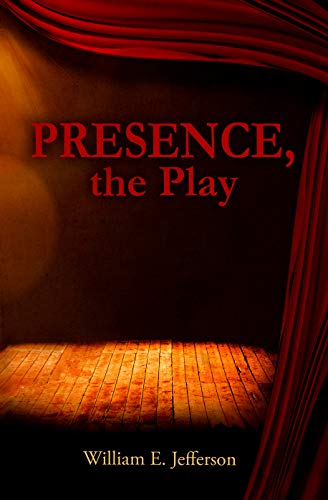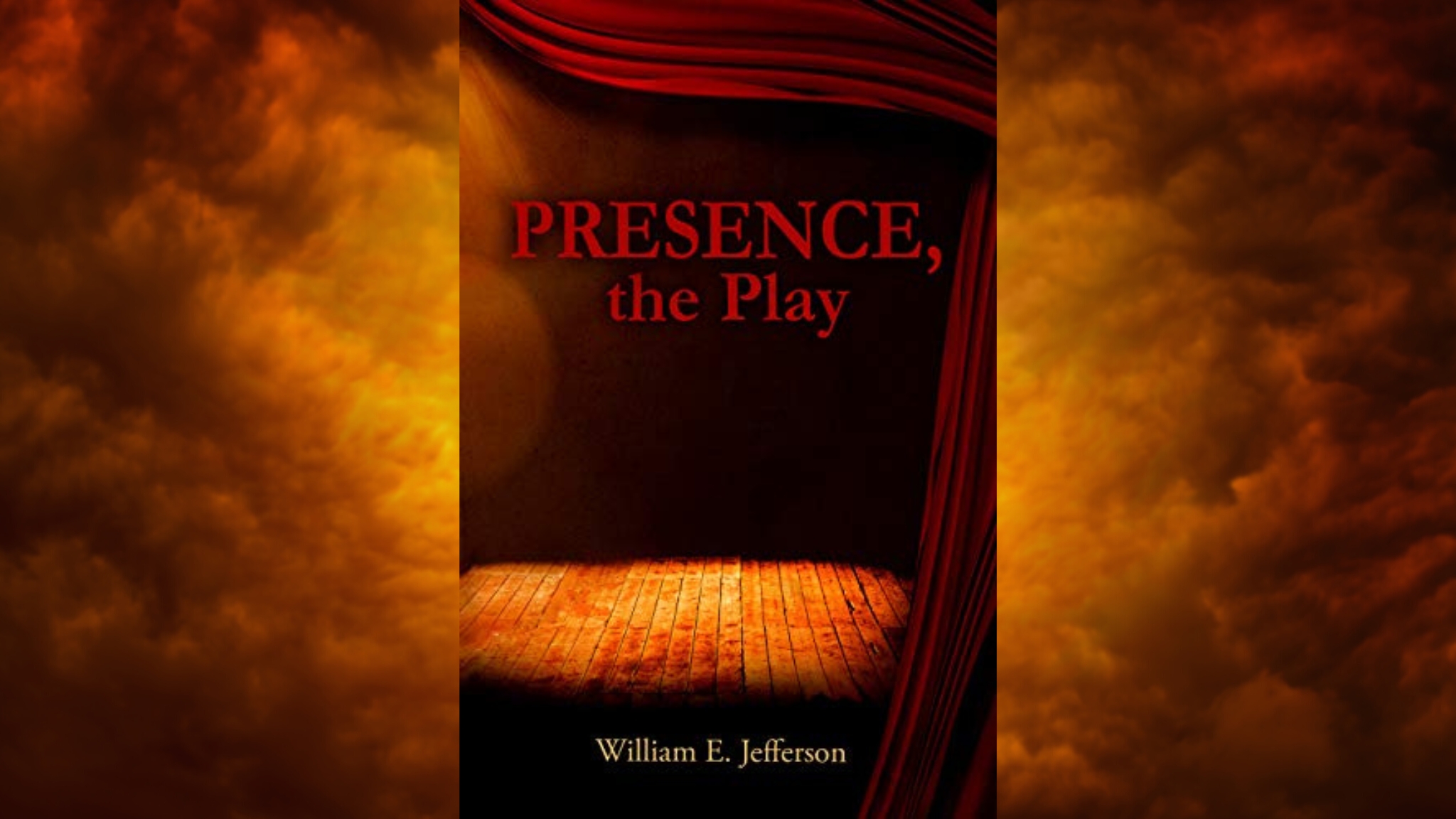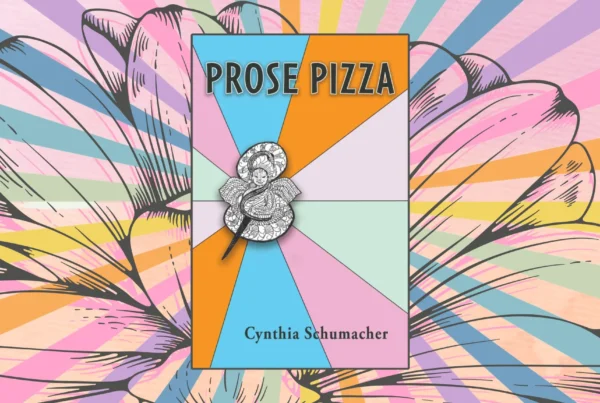Presence, the Play by William Jefferson
Cinema and live theater exist in two very different, albeit parallel, universes. They both contain storytelling and scenery, propelled along by the actions and words of characters and — preferably — a good director.
That’s where the similarities end. Cinema contains immutable performances that may be replayed again and again in perpetuity (and now also on demand). Theater, however, is ephemeral. The performance takes place at an intersection of time and space and then is no more.
But the magic of theater goes beyond that, to our collective participation in that same story-space as active witnesses rather than passive voyeurs. In Presence, the Play, William E. Jefferson’s protagonist puts it like this: “So many years, scripts scripted, performers performing, music scored, songs sung — it’s live, it’s real, it’s present. The theatre — what can be better, tell me? You can’t.” [Italics mine.]
But don’t let the title of this book fool you; Presence, the Play is a novel. A novel in which we, as readers, are treated to an allegorical tale woven across multiple levels: Christian theology, media critique, the hero’s journey, poetic reimagining of classic works, and sheer entertainment. All wrapped in an exploration of the concept of presence and its many manifestations, both divine and mundane.
A Scriptwriter Thrust Into the Hero’s Role
The tale centers on the spiritual journeys of Brother Script, a member of the Order of Message Makers, a group of storytelling monks. They live on Estillyen Isle, surrounded by the misty Storied Sea, a sort of semi-mythical Hy-Brasil. Brother Script has toiled for years on his latest play, Presence, and it is opening night at the stately Theatre Portesque. And then the unexpected happens.
As Script is fussing about near his balcony seat, he loses his footing, strikes his head against the railing and falls into a deep coma that plunges him into what can only be described as a parallel world. It’s a world where he will encounter a trio of spiritual guides who assist him in traveling to hell and back, attempting to uncover and stop Satan and his nefarious plans to subjugate humanity, starting with Script’s own beloved isle of Estillyen.
It’s a dangerous mission, and not one that Script is entirely prepared for or willing to undertake. His only link to the incarnate world is a gold ribbon, which had cordoned off Script’s reserved theater seat. That, and the sounds of a mockingbird, which has manifested in this other world as his steadfast avian companion, Mock.
Literary and Scholarly Allusions Abound
While Jefferson calls upon the works of Frost, Chaucer and Poe to add depth to the story, it is Dante’s Inferno and biblical texts that inform the novel as a whole. With each trip to hell, Script must pass through one of five doors that open onto a scene related to stories from the Gospels. He must observe the characters and their interactions, then find and follow a path to hell.
Jefferson’s visions of Hades are wildly imaginative, populated by armies of tussling swarms of demons and vast numbers of sinners getting their (often ironic and thoroughly modern) comeuppances. Instead of Dante’s nine circles of hell, we explore new depths: the Seven Valleys of Sin, the Reservoirs of Bewilderment, the Crimson Cliffs, the Gargantuan Gorge. It’s a delight for fans of this genre.
The mythos surrounding Lucifer’s fall is fleshed out with a tantalizing backstory: his rebellion began when he objected to God’s plans for the creation of Man. This adds color and complexity to his motives in attempting to subjugate humanity with what he terms presence passé — a world where screens, AI, algorithms, social media, and all manner of “mediated ecology” leads humankind down the path of discarnate life and away from incarnate presence. His goal? Get God to give up on humanity.
Presence is full of academic easter eggs for readers with background in Judeo-Christian theology, media studies, and literature. Prior familiarity with these areas isn’t necessary, however, to follow and enjoy this tale. Script is a lovable, relatable and somewhat quirky character, and there’s much humor to be found as our unwitting protagonist bumbles his way through the hero’s journey.
A Writing Style That’s Literary, Yet Accessible
Jefferson’s writing style is often poetic, with close attention to imagery and the sound of language. His characters’ dialogue takes on a playful quality. These characteristics are accompanied by some distinct stylistic idiosyncrasies. For example, throughout the novel, Jefferson has his characters describe for each other the action and scenery as it unfolds. This creates an odd effect; somewhat like storytelling via the conventions of a radio play but used within the literary form of a novel. The story isn’t merely narrated; it comes into being as co-creation. This is but one way in which Jefferson plays with the concept of “presence” in the novel.
In these idiosyncrasies, there’s something that reminds me of French literature between the wars, though I can’t quite put my finger on it. Perhaps it’s in Jefferson’s subversion of writing conventions — an aesthetic shared with the theater of the absurd, ‘pataphysics, Oulipo and so on.
Regardless, Jefferson does so in a highly accessible way that does not sacrifice story for literary experimentation. All in all, Presence, the Play is a satisfying read for lovers of the spiritual, the literary and the fantastic.
About William Jefferson:
 William Jefferson is on the board of the Marshall McLuhan Initiative (MMI) in Winnipeg, Manitoba, Canada. He writes from a Civil War-era cottage in the rural Ozarks and is the owner of Storybook Barn, an all-occasion event venue. He holds an MTh in Theology and Media from the University of Edinburgh, and an MA in Communication from the Wheaton Graduate School. Visit www.estillyen.com.
William Jefferson is on the board of the Marshall McLuhan Initiative (MMI) in Winnipeg, Manitoba, Canada. He writes from a Civil War-era cottage in the rural Ozarks and is the owner of Storybook Barn, an all-occasion event venue. He holds an MTh in Theology and Media from the University of Edinburgh, and an MA in Communication from the Wheaton Graduate School. Visit www.estillyen.com.






